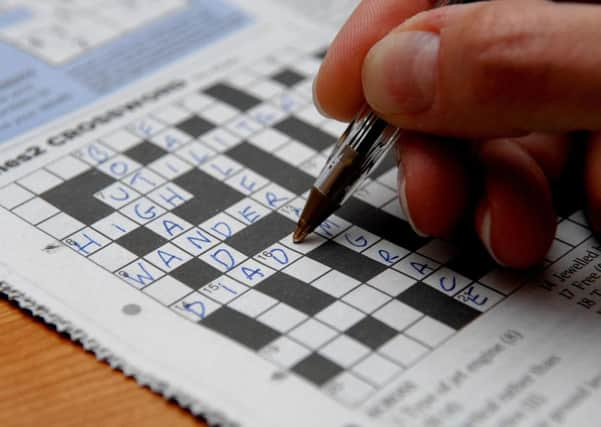One across: What activity practised daily can help brain health? (10 letters)


Experts analysed data from more than 17,000 healthy people aged 50 and over submitted in an online trial.
The team at the University of Exeter Medical School and Kings College London asked participants how frequently they played word puzzles such as crosswords.
Advertisement
Hide AdAdvertisement
Hide AdThe study, one of the largest of its kind, used tests from the CogTrackTM and Protect online cognitive test systems to assess core aspects of brain function.
They found that the more regularly participants engaged with word puzzles, the better they performed on tasks assessing attention, reasoning and memory.
From their results, researchers calculate that people who engage in word puzzles have brain function equivalent to 10 years younger than their age, on tests of grammatical reasoning speed and short-term memory accuracy.
Professor Keith Wesnes, from the University of Exeter, said: “We found direct relationships between the frequency of word puzzle use and the speed and accuracy of performance on nine cognitive tasks assessing a range of aspects of function including attention, reasoning and memory.
Advertisement
Hide AdAdvertisement
Hide Ad“Performance was consistently better in those who reported engaging in puzzles, and generally improved incrementally with the frequency of puzzle use.
“For example, on test measures of grammatical reasoning speed and short-term memory accuracy, performing word puzzles was associated with an age-related reduction of around 10 years.
“We now need to follow up this very exciting association in a clinical trial, to establish whether engaging in puzzles results in improvement in brain function.”
The scientists are hoping their work will identify the lifestyle factors that will help people maintain healthy brains.
Advertisement
Hide AdAdvertisement
Hide AdProfessor Clive Ballard, also from the University of Exeter, said: “We can’t yet say that crosswords give you a sharper brain, the next step is to assess whether encouraging people to start playing word games regularly could actually improve their brain function.”
Dr Doug Brown, from the Alzheimer’s Society, added: “We know that keeping an active mind can help to reduce decline in thinking skills.
“This new research does reveal a link between word puzzles, like crosswords, and memory and thinking skills, but we can’t say definitively that regular ‘puzzling’ improves these skills.
“To be able to say for sure, the crucial next step is to test if there are benefits in people who take up word puzzles.
“In the meantime, our top tips to reduce the risk of developing dementia are keeping physically active, avoiding smoking and eating a healthy balanced diet.”